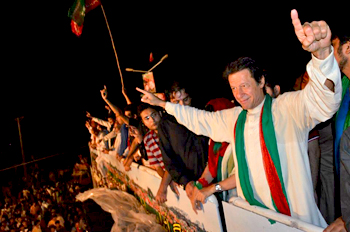 Islamabad, Aug 20: Pakistan opposition leader Imran Khan and cleric Tahirul Qadri tonight marched with thousands of their supporters towards the Parliament, entering the heavily fortified 'Red Zone', the capital's diplomatic and political enclave, even as minor clashes took place between anti-government protesters and security personnel.
Islamabad, Aug 20: Pakistan opposition leader Imran Khan and cleric Tahirul Qadri tonight marched with thousands of their supporters towards the Parliament, entering the heavily fortified 'Red Zone', the capital's diplomatic and political enclave, even as minor clashes took place between anti-government protesters and security personnel.
"Promise me, if something were to happen to me, you will take revenge from Nawaz Sharif," Khan said while addressing his supporters before starting his march towards the Red Zone that houses important government buildings including the Parliament House, Prime Minister House, President House, the Supreme Court besides embassies of various countries.
Unfazed by army deployment, the Pakistan Tehreek-i-Insaf chief and Qadri marched towards the Parliament demanding Prime Minister Nawaz Sharif's resignation, putting the PML-N-led government on the backfoot.
Khan said that he has given Prime Minister Sharif till tomorrow evening to resign."If Nawaz Sharif does not resign then we will enter into the PM House," said the PTI chief.
Police baton-charged Qadri's Pakistan Awami Tehreek (PAT) protesters as they neared the Parliament.
Anti-government protesters entered the Red Zone, even as clashes took place between them and the police. After the initial minor skirmishes, police slowly retreated as part of policy to avoid violence.
The protesters had reached the Constitution Avenue as the government decided to withdraw security forces.
"PM just told me he has ordered the police not to use any kind of force against the protesters as women & children are in the front rows," Sharif's daughter Maryam Nawaz Sharif tweeted.
Inter-Services Public Relations spokesperson Asim Bajwa tweeted: "Bldgs in red Zone r symbol of State & being protected by Army, therefore sanctity of these national symbols must be respected."
"Situation requires patience, wisdom & sagacity from all stakeholders to resolve prevailing impasse through meaningful dialogue in larger national and public interest," he said.
Pakistan Army has also taken charge of the Interior Ministry's control room, Dawn News reported.
The protesters of Khan and Qadri started separately but later were moving towards the Parliament together. Thousands of anti-government protesters planned to stage a sit-in in an open ground in front of the building.
Information minister Pervaiz Rashid told Geo TV that the marchers have violated written commitment that they will not enter the Red Zone.
"They have women and children with them. So the government has decided to show maximum restraint. They want dead bodies but we will not give them the opportunity despite provocations," he said.





Comments
Add new comment